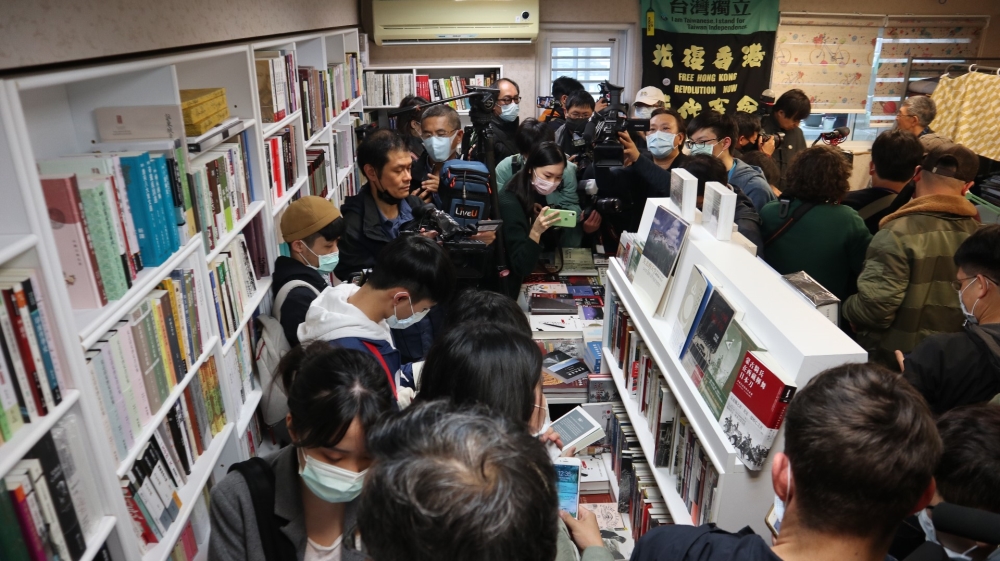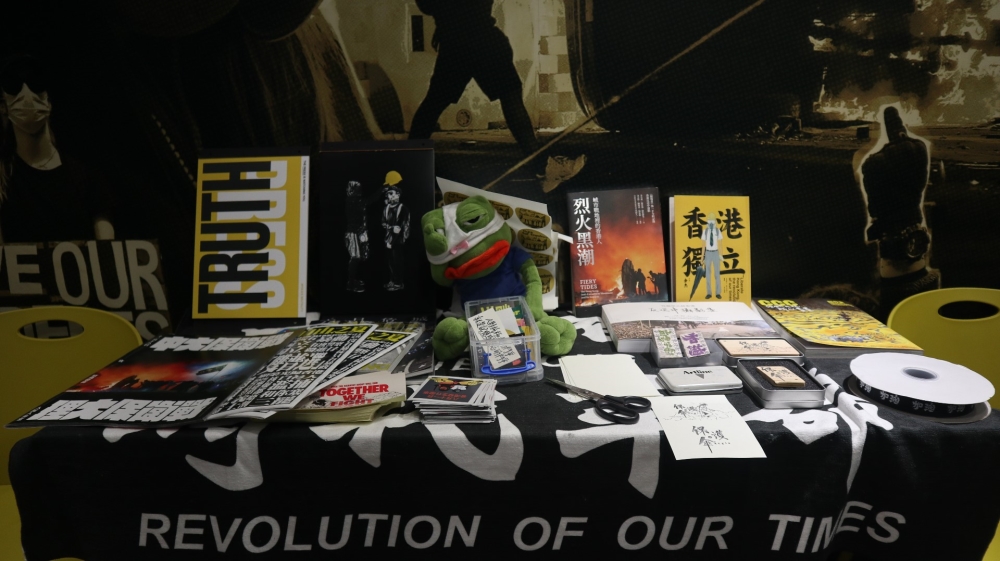Hong Kong dissidents a further test for Taiwan-China ties
Taiwan has quietly welcomed Hong Kong dissidents, but does not offer political asylum or formal assistance.

Taipei, Taiwan – Lam Wing-kee signed books, posed for pictures and teased customers about their reading selections. The publisher had waited nearly five years to reopen Causeway Bay Books, an independent store in Hong Kong that was forced to close in 2015 when Lam was detained in China for selling books critical of the Communist Party leadership.
The store’s new location? Taiwan’s capital, Taipei.
Keep reading
list of 3 itemsGeneration next: How the young are changing Taiwan’s politics
Hong Kong activists arrested over last year’s mass protests
“I’m here to continue the fight with this bookstore,” Lam said. “The resistance effort continues here.”
The small 10th-floor shop in the heart of Taipei was packed with customers during the official opening on Saturday. Among them were Yu Shyi-kun, head of Taiwan’s parliament and Luo Wen-jia, secretary-general of the governing Democratic Progressive Party.
President Tsai Ing-wen sent a bouquet of orchids, too, in what many saw as a show of solidarity not just with Lam, but also with protesters challenging Beijing’s growing influence over Hong Kong’s affairs. The protest movement had escalated last year when legislators in Hong Kong moved to pass a bill that would allow residents of the semiautonomous Chinese territory to be extradited to the mainland for trial.
Fearing his possible extradition, Lam – whom Beijing considers a fugitive after he jumped bail – left Hong Kong for good last April.
“I encourage Hongkongers to come,” said the 64-year-old. “Don’t be so stubborn and get killed in Hong Kong.”

Self-ruled Taiwan, which China claims as its territory, has become a refuge for Hong Kong people fleeing persecution at home. But many of those dissidents are not able to formally seek asylum on the island with Taipei seemingly unwilling to risk Beijing’s wrath by approving a legal framework for refugees and asylum seekers.
And Lam’s case is also seen as a test for Hong Kong dissidents, especially with authorities in the territory continuing to crack down on the protest movement. Just last week, authorities arrested 15 leading democracy activists, including Martin Lee, known as the “father of democracy”.
Tsai won a landslide re-election in January on the back of her opposition to China’s influence over Taiwan. Since her election in 2016, ties between Taiwan and China have deteriorated sharply, with Beijing successfully lobbying countries around the world to sever diplomatic ties with Taipei and exclude the territory from global agencies. While Tsai rejects China’s claims over Taiwan, she has stopped short of seeking independence for the territory – a red line for Beijing, which has threatened to use military force, if necessary, to annexe the island.
The island’s global isolation “has allowed solidarity to consolidate” between the peoples of Taiwan and Hong Kong, said Jeffrey Ngo, chief researcher of the Hong Kong activist political group Demosisto. People of Hong Kong now “view Taiwan with admiration”, he said.
“The fact that that [Lam’s] bookstore has ceased to exist in Hong Kong, but is now coming to existence in a similar fashion using the same name by one of the same guys, happening in Taipei is a testament to how much Taiwan is able to offer what has been lost in Hong Kong,” Ngo added.
‘Freedom is like air’
Tsai was quick to offer support to Hong Kong’s protest movement when it began to gain steam last year. “[We] support the people of Hong Kong in pursuit of freedom, democracy and human rights,” Tsai said in June. “Freedom is like the air: you only become aware of its existence when you start to suffocate.”
However, concern about Chinese retribution may have kept her government from taking firmer action to support dissident Hong Kong people on the island. While Taiwan has eased visa regulations for Hong Kong people applying for work and study visas, the territory’s laws do not provide a path towards political asylum for those who cannot obtain such permits.
Hundreds of people from Hong Kong now live in Taiwan, according to support groups, but many are either undocumented or reliant on monthly tourist visa extensions. Without legal protection, they have fallen victim to scammers and actors falsely promising visas or publicising their plight to solicit donations.
|
|
And although Taiwan has quietly allowed Hong Kong people to stay, it has received criticism for not providing formal assistance – work which falls to a small group of NGOs and religious organisations.
Since Tsai’s January re-election, “she has not pursued any policy [of] institutional change to help Hongkongers”, said Lev Nachman, a Fulbright research fellow in Taiwan researching social movements in Taiwan and Hong Kong. This means those who cannot afford to study and cannot find jobs have no guarantee of staying in Taiwan and cannot receive benefits granted to residents, such as health insurance and driving licence.
“Employment opportunities, legal protection and visas are still the three things Hongkongers need the most,” he said.
Without such protections, some dissidents from Hong Kong feel insecure, he said.
Last week, a restaurant employing Hong Kong people who have fled to Taiwan called Aegis opened in Taipei’s university district. But the Aegis staff, like most of those who left for Taiwan after the protests started, do not identify themselves publicly for fear of retribution.
“They do not feel safe for themselves or their family and friends back in Hong Kong,” said Nachman. “No political refugee here wants a spotlight because they feel like they might be targeted.”
Lam has expressed similar concerns. On Tuesday, he was attacked with red paint while eating breakfast at a Taipei coffee shop. Three men were arrested for their involvement in the incident.
Threats
On Wednesday, messages threatening to kill Lam were left on the Facebook pages of Taiwan’s Mainland Affairs Council and the American Institute in Taiwan. Authorities said on Friday they believed the messages came from a Chinese national living in Singapore.
Last September, Hong Kong activist Denise Ho was attacked with red paint by members of a fringe pro-unification group during a visit to Taipei.

Taiwan passed legislation targeting Chinese infiltration last December, days before Tsai’s election victory, which stiffens penalties for foreign actors trying to influence Taiwan’s politics by funding politicians and the media. The law, along with Taiwan’s support of Hong Kong protesters, is popular domestically. But there are fears Beijing could retaliate should Taiwan become too bold and loud in its advocacy for Hong Kong’s pro-democracy movement, especially as Taipei’s international standing grows as a result of its successful response to the coronavirus pandemic.
“Beijing is putting pressure on Hong Kong and looking for something that shows Tsai is pursuing something that is really independence,” said Bonnie Glaser, director of the China Power Project at the Center for Strategic and International Studies.
Tsai has always declined to take steps towards formal independence, with Beijing vowing to use forces to annex the island should it seek that path. Chinese officials have accused Taiwan of being complicit in Hong Kong’s protests in the past, a charge Taiwan has sharply denied.
“This is a very delicate time for Tsai Ing-wen,” Glaser said.
In this context, Lam’s success in finding a path to stay in Taiwan may encourage other Hong Kong people to make the move to Taiwan when coronavirus-related travel restrictions are lifted.
He hopes his bookstore serves as an inspiration to others. For now, he said, he simply wants to encourage people to read.
“A lot of Taiwanese people came to support the bookstore, but I can’t just settle with the turnout today. I want to see if this a trend, that young people in Taiwan or from Hong Kong are reading,” Lam said.
Despite the threats and the paint attack, Saturday’s opening was flooded with well-wishers. Customers nudged through the packed shop to give Lam cakes and flowers and wish him luck.
Lam expressed confidence that, in Taiwan, he would be legally protected and allowed to do his job: selling books.
“For me, the idea of fear doesn’t exist,” he said of the paint attack. “What they did is illegal, so they should be the ones who are afraid.”